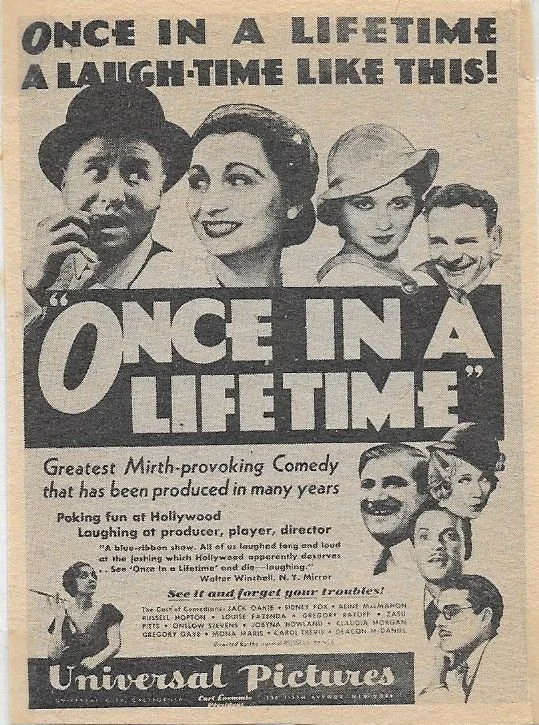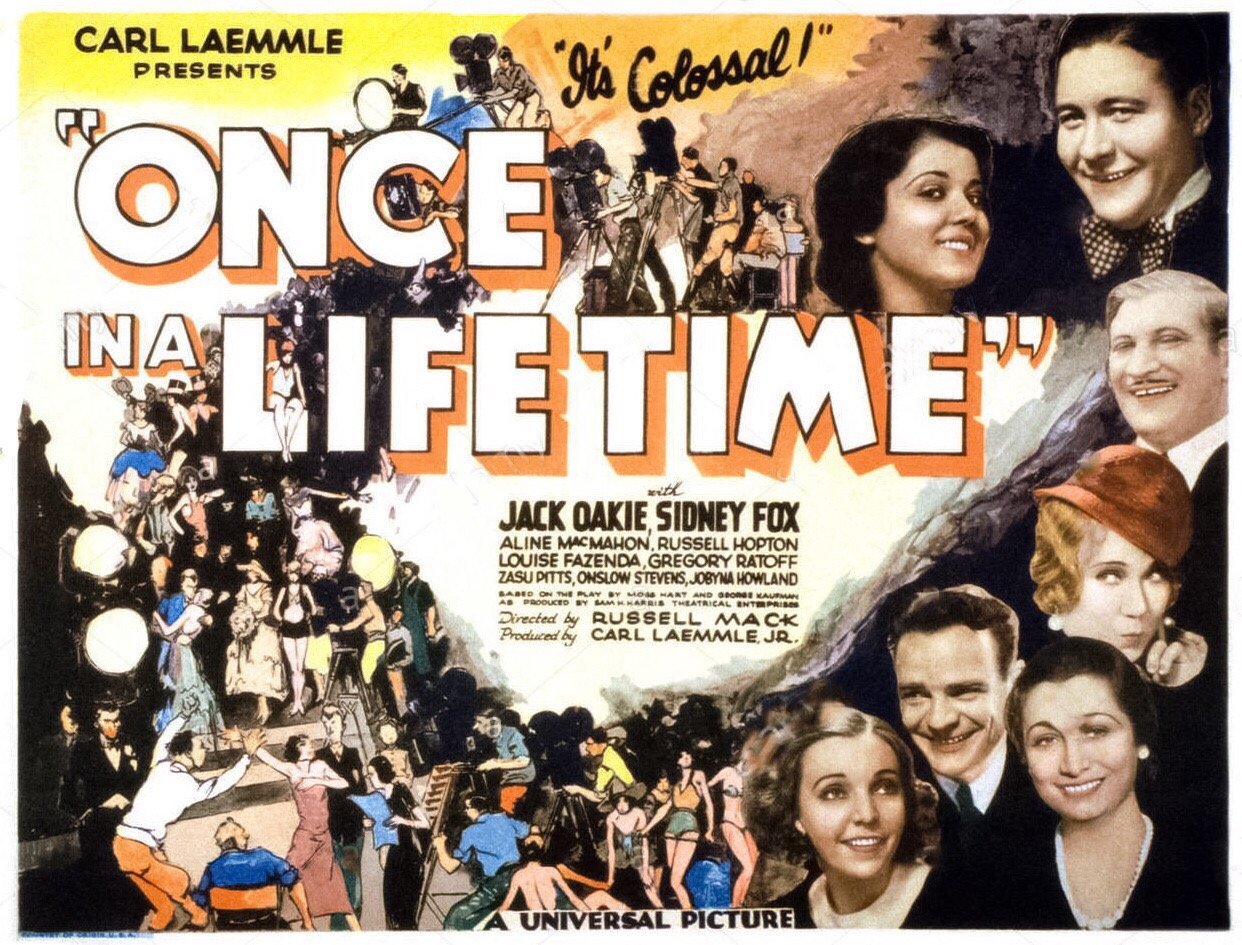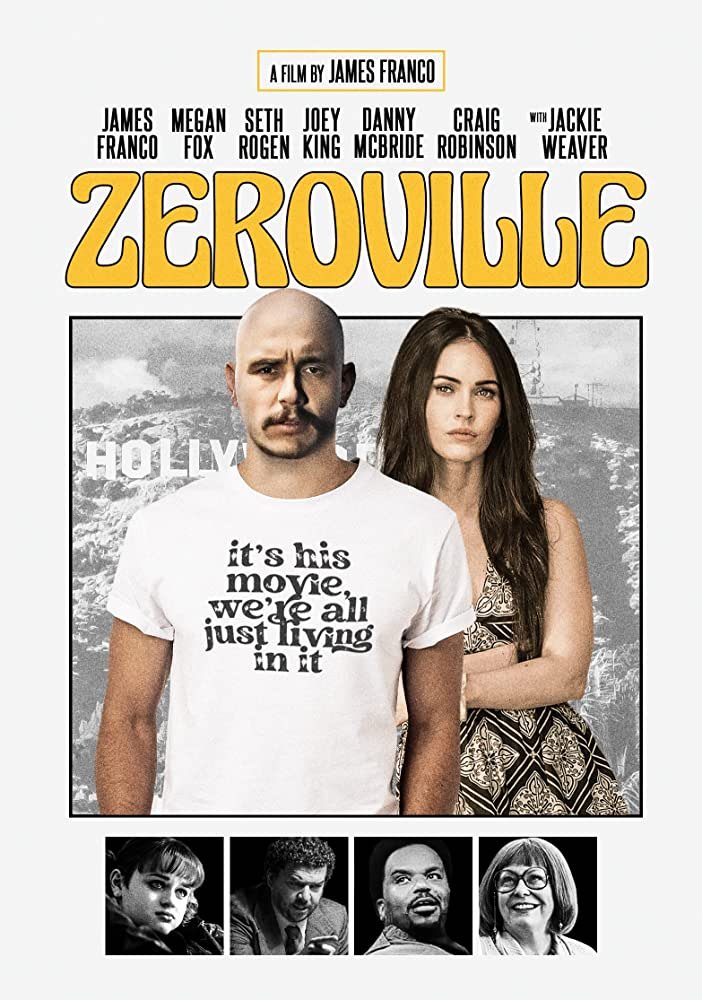Shards from the Fractured Mirror: Jolson Rides Again, The Legend of Lylah Claire, Once in a Lifetime, The Pretenders, Shrink, Sweet Liberty, With Friends Like These and Zeroville
For the last year or so much of my time and energy has been devoted to working on The Fractured Mirror, my upcoming book about movies about the movie business. I’ve posted much longer versions of some of the pieces that I’ve written for the book on this website but the vast majority I only shared with people who pre-ordered the book through Kickstarter and Backerkit or who donate to this site’s Patreon page.
I’m quite proud of the work I’ve done on the book, as well as the kooky assortment of movies I’ve covered so I figured that every month I would share a handful of pieces I’ve written for The Fractured Mirror with y’all. I’ve written up 287 movies so far and will cover 365 in total so I am very open to recommendations on movies to write about.
In conclusion, please donate to my site’s Patreon page. I desperately need the income and I’d love to share these new pieces with as many people as possible.
Jolson Sings Again (1949)
The 1946 Al Jolson biopic The Jolson Story was such a big hit that the studio decided to make a sequel. Unfortunately, The Jolson Story covered just about everything in its subject’s life along with plenty of made-up hooey concocted specifically for it. So the makers of 1949’s Jolson Sings Again went to the shameless extreme of making the sequel to The Jolson Story a show-business melodrama at least partially about the behind the scenes production of The Jolson Story. Larry Parks consequently reprises his Academy Award-nominated role as the legendary singer but he also plays himself as the star of The Jolson Story, sometimes through the use of split screens.
Jolson Sings Again picks up exactly where its predecessor left off. After giving up show-business and all of its spoils for his movie star wife, Jolson returns triumphantly to singing. He loses his disapproving wife in the process. He’s lost and aimless following the divorce so he gallivants about the globe enjoying his money and success. Jolson finds direction and purpose entertaining troops during World War II and later by recording the vocals for a smash hit screen biography that shatters box-office records and makes the Jazz Singer crooner wildly popular all over again.
At its most dazzlingly, ridiculously masturbatory and self-indulgent, Jolson Sings Again has Larry Parks’ Al Jolson watch Larry Parks play him onscreen in The Jolson Story and be so blown away and impressed that he can’t tell the difference between footage of himself performing and shots of Parks impersonating him. The third act of Jolson Sings Again is a wildly unearned victory lap gloating over the incredible, undeserved success of The Jolson Story.
The filmmakers simply can’t get over what an amazing job they did the last time around but audiences will be less impressed. Jolson Sings Again is at least honestly titled. Like The Jolson Story, it’s little more than an excuse to hear Jolson confidently croon the Great American Songbook.
Jolson Sings Again is fascinatingly, perversely padded and unnecessary, a movie that does not need to exist. Yet it nevertheless became the top-grossing film of 1949. Jolson Sings Again’s incredible popularity is a testament to the spell Jolson continued to cast over his adoring public decades after his commercial peak.
The Legend of Lylah Clare (1968)
Robert Aldrich’s gloomy 1968 show business melodrama The Legend of Lylah Claire audaciously cast Kim Novak in a role that doesn't just invite comparisons to her career-defining turn in Vertigo, it demands them. The Legend of Lylah Claire once again finds Novak playing an overwhelmed, naive young woman asked to impersonate a beautiful, mysterious dead beauty who is the subject of intense erotic obsession in a gothic tale involving enigmatic figures plummeting to their deaths.
In an excessively challenging dual role Novak plays Elsa Brinkmann, an inexperienced young actress who is a dead ringer for Lylah Claire, a legendary sex bomb who riveted the moviegoing public with her raw sexuality before dying mysteriously on her wedding night to director and star-maker Lewis Zarkan (Peter Finch).
The mercurial filmmaker returns to the big screen after an extended absence for vulgar studio executive Barney Sheean (Ernest Borgnine) with a biopic of his late wife starring her doppelgänger but the inexperienced starlet doesn’t just act like the dead movie star: she seems literally possessed by her both on set and off.
The American breaks into a Teutonic accent intermittently that is supposed to be redolent of Marlene Dietrich but sounds more like Mike Myers’ Dieter character from Saturday Night Live.
Aldrich had some of Novak’s lines dubbed by German actress Hildegard Knef when she’s overtaken by the libertine spirit of a legendarily debauched pleasure seeker whose insatiable lust for men and women titillated and enraged the public and the people closest to her.
The Legend of Lylah Claire is haunted throughout by the legend of Vertigo but it also bears a distinct resemblance to two earlier Aldrich movies as well: Whatever Happened to Baby Jane, another campy melodrama about the scarring, traumatizing effects of fame, and The Big Knife, another talky, muscular drama about Hollywood soul sickness featuring a ferocious acting battle between Oscar-winning hams.
Aldrich made morbid magic out of this melodramatic material with Whatever Happened to Baby Jane but The Legend of Lylah Claire is pure kitsch, high camp that goes over the top and just keeps on going.
The Legend of Lylah Claire does not benefit from inevitable comparisons to Vertigo and Whatever Happened to Baby Jane but it doesn’t need to be compared to all-time classics to come off as misconceived and wildly overwrought.
Once in a Lifetime (1932) FM
The 1932 feature film adaptation of Moss Hart and George S. Kaufman’s hit play Once in a Lifetime opens on a hilariously self-aggrandizing note, literally and figuratively. The scathing Hollywood satire begins with a letter from producer/executive Carl Laemmle Jr. insisting that when he bought the film rights to Hart and Kaufman’s play critics insisted that it would be a mistake to use its best material on account of it being “too funny” and it would “make the world laugh at us.” The son of Universal’s founder closes by insisting that entertaining the suffering masses was worth the potential damage to the movie world’s reputation.
Once in a Lifetime opens in the zeitgeist-changing afterglow of The Jazz Singer. The birth and rise of talkies spells doom for vaudeville so stage veterans Jerry Hyland (Russell Hopton), May Daniels (Aline MacMahon) and George Lewis (Jack Oakie) head to Hollywood to open an elocution school for a medium that only recently learned how to talk.
The trio discovers that Hollywood is an upside down town where talent and hard work are punished and ignorance and buffoonery are rewarded. Gifted playwright Lawrence Vail (Onslow Stevens) is driven mad by the casual sadism of the business while good-natured, sweet-faced dope George Lewis, now calling himself Dr. Lewis, rises to incredible heights through a combination of stupidity and flagrant ineptitude.
George Lewis cuts an unmistakably Chauncey Gardiner-like figure. He’s a holy fool whose simple-mindedness is mistaken for insight and wisdom. He can’t stop failing upwards in an industry where he is mistakenly deemed a savant rather than an idiot.
Once in a Lifetime earns its introductory bluster. It mercilessly and hilariously pokes fun at Hollywood and its daffy denizens and affords moviegoers beaten down by the Great Depression an opportunity to enjoy a long, deep, satisfying laugh at the film industry’s expense. In a world with legendary wits like Moss Hart and George S. Kaufman, there’s no such thing as “too funny”, just appropriately hilarious, and this whip-smart, machine-gun-paced winner sure qualifies.
The Pretenders (2018)
James Franco puzzlingly seems to have gotten into acting primarily so that he could direct movies about actors, actresses and filmmakers. In the twenty-teens alone he explored his craft through the 2011 Sal Mineo biopic Sal Mineo, the 2013 Cruising meditation Interior. Leather Bar, his crowd-pleasing 2017 adaptation of Greg Sestero’s memoir The Disaster Artist, the ill-fated 2019 adaptation of Steve Erickson’s Zeroville and finally 2018’s The Pretenders. If The Pretenders is not the worst of the bunch that’s only because Zeroville set the bar so impossibly low The Pretenders can’t help but clear it.
A clumsy homage to the French New Wave and Bernardo Bertolucci, The Pretenders opens in 1979, at the tail end of New Hollywood. Perplexingly passive protagonist Terry (Jack Kilmer) is a film student and aspiring filmmaker enraptured by the films of Jean-Luc Godard and besotted with actress Catherine (Jane Levy). Terry’s best friend, hotshot photographer, film professor and lady’s man Phil (Shameik Moore) is equally enamored of the gorgeous thespian.
The Pretenders follows its star-crossed lovers as the disco era fades into the Reagan years and Catherine tries to juggle her romantic and sexual feelings towards the cinephile compadres.
Last Tango in Paris is referenced throughout The Pretenders but the Bertolucci film it most resembles is The Dreamers. Franco, who also plays a supporting role as a hotshot filmmaker whose actress wife Victoria (Juno Temple) leaves him for Terry, has made an empty, pretty romance that suggests Jules and Jim as a feature-length perfume ad.
The Pretenders angrily insists that its hero is passionate and poetic about life, love and, above all else film, when he comes off as an afterthought of a man played by an actor who is but a tinny echo of his famous father Val. This empty parade of melodramatic posturing isn’t a tragedy. It’s just a bummer.
Shrink (2009)
In the impossibly mopey 2009 melodrama Shrink, Kevin Spacey plays Dr. Henry Carter, a superstar self-help author desperately in need of help. He’s the author of the best-seller Don’t Be Sad as well as the world’s saddest man.
When he’s not ineffectively self-medicating for depression and grief over his wife’s suicide with weed and alcohol he’s numbly treating a gaggle of movie world players, including self-destructive actor Jack Holden (an uncredited Robin Williams) and OCD agent Patrick (Dallas Roberts).
The surly psychiatrist with the vacant expression is cajoled by his father into treating a troubled teenage cinephile Jemma (Keke Palmer) pro bono, a gig that leads indirectly to the doctor’s painfully earnest screenwriter friend Jeremy (Mark Webber) writing a much buzzed about script abut Jemma without her knowledge or approval.
Jonas Pate’s dour, one-dimensional character study begins on a note of world-weary existential exhaustion it deviates from only for a series of big, phony, theatrical moments, at least one of which involves our deeply unlikable protagonist having a breakdown on television opposite an interviewer played by Gore Vidal. This is misery porn, pure and simple, an unedifying wallow in the existential emptiness of self-hating, self-defeating show-business folks.
Shrink is a grim, joyous exploration of how suffering, sadness and loss unite us all in a great cosmic circle of unending misery that is itself an arduous chore to suffer through.
Sweet Liberty (1986) FM
In the winning, slight, winningly slight 1986 movie world comedy Sweet Liberty writer, director and star Alan Alda is upstaged by pretty much everyone else in the cast. Such is the existential plight of the straight man. As an actor as well as a filmmaker, Alda is a generous soul happy to let more charismatic performers get big laughs while he drolly under-reacts.
The M*A*S*H star and exemplar of 1970s male sensitivity stars as Michael Burgess, a professor and author whose orderly life is turned upside down when an army of movie people descend upon his home town to make a movie based on one of his books about the Revolutionary War.
The heavyweight academic’s historical drama has been transformed into a lowbrow comedy by respectability-hungry screenwriter Stanley Gould (Bob Hoskins) and director Bo Hodges (Saul Rubinek). Rubinek is hilarious as a smiling viper of a filmmaker convinced that the key to cinematic success lies in defying authority, destroying property and gratuitous nudity.
Michael Caine plays Elliott James, the star of the film and a womanizer for whom seducing beauties comes as naturally as breathing or eating while Michelle Pfeiffer delivers a deceptively tricky, complicated performance as the movie’s female lead Faith Healy. Lillian Gish rounds out a ridiculously over-qualified cast in the juicy Ruth Gordon role of our hero’s senile and half-mad mother, an ingratiatingly daffy old lady who seems to be living in her own world.
Sweet Liberty mines a rich vein of culture-clash comedy in the conflict between small town folks overjoyed to be in the presence of bona fide movie people and Hollywood slicksters whose decadent ways can’t help but infect their humble hosts. Sweet Liberty is an eminently enjoyable little lark. The movie’s most memorable moments might belong to everybody but its writer-director-star but that is ultimately, and entirely by design.
With Friends Like These (1998) FM
The professional opportunity of a lifetime engenders feverish competition and back-stabbing among four longtime actor friends in Philip Frank Messina’s smartly observed 1998 show business comedy With Friends Like These.
Veteran character actors David Strathairn, Adam Arkin, Jon Tenney and Robert Constanzo play very different friends with a shared dream: to play Al Capone in a movie directed by Martin Scorsese. Strathairn is the artist of the group, a mysterious man of means his friends think might be mob-connected. Tenney is the handsome womanizer, Arkin the nebbishy Jew while Robert Costanzo is a fire hydrant shaped family man frustrated with an endless series of bit parts as cab drivers and hitmen.
Strathairn, Arkin, Tenney and Costanzo have wonderful, lived-in chemistry as a gaggle of narcissistic small timers angling desperately for a shot at the big time. They’re quintessential supporting players who make the most of juicy lead roles as, appropriately enough, supporting players willing to do just about anything for a juicy lead role.
This is a world the filmmakers and cast know intimately. With Friends Like These works best as an actor’s showcase for its four leads but it’s blessed with hilarious cameos from Michael McKean, Garry Marshall and particularly Bill Murray as a cheapskate producer who seems to have gotten into show-business primarily for the free food.
With Friends Like These stumbles at the end with climactic auditions that ring frustratingly false. The film loses its otherwise sure hand on the material when it focus shifts from acting to ACTING but has built up enough goodwill by that point to make its disappointing conclusion unfortunate but eminently forgivable.
Zeroville (2019)
In the half decade separating the filming of James Franco's poorly received adaptation of Steven Erickson's novel Zeroville in 2014 and its 2019 pity release James Franco went from being an insanely prolific, popular and gifted actor and creator whose career radiated all the promise in the world to a troubled and problematic figure accused of all manner of sexual impropriety.
Even Franco's successes during this time period ended up working against his god-forsaken, ill-advised take on New Hollywood. 2017's wildly entertainingThe Disaster Artist, which was filmed years after Zeroville yet released two years before Franco's adaptation of Erickson's book, makes Zeroville even worse by comparison, as does Quentin Tarantino's 2019 masterpiece Once Upon a Time… in Hollywood, which is everything Franco's fiasco desperately wants to be but is not.
In a performance both appalling and deeply offensive, Franco plays Vikar, an autistic savant who comes to Hollywood in 1969 in the immediate aftermath of the Tate-Labianca murders with an eye towards making it in the motion picture business despite having seen his first film less than a year earlier.
He's a monk-like figure whose religion is cinema and whose gods are Montgomery Clift and Elizabeth Taylor, whose sainted images are tattooed on his shaved head.
Franco plays his profoundly passive protagonist as a Forrest Gump figure who can't help but stumble obliviously into film and punk rock history in his single-minded pursuit of art and truth as well as Soledad Miranda (Megan Fox), a beautiful film actress he loves because she embodies the danger and glamour and incandescent sensuality of film.
Zeroville ineptly cross-pollinates Forrest Gump, Rain Man and Easy Riders and Raging Bulls in its patently phony take on one of the most exciting and dangerous periods in American film. Franco is a twitchy blank at the film's hollow core, all vacant stares, moody intensity and blunt, child-like statements delivered in an affectless monotone.
When it comes to the fascinating, maddening, endless juicy subject of American movies about the film industry Franco's insufferable New Hollywood dress-up costume party comes up last alphabetically and also in terms of quality.
Check out my newest literary endeavor, The Joy of Trash: Flaming Garbage Fire Extended Edition at https://www.nathanrabin.com/shop and get a free, signed "Weird Al” Yankovic-themed coloring book for free! Just 18.75, shipping and taxes included! Or, for just 25 dollars, you can get a hardcover “Joy of Positivity 2: The New Batch” edition signed (by Felipe and myself) and numbered (to 50) copy with a hand-written recommendation from me within its pages. It’s truly a one-of-a-kind collectible!
Or you can buy The Joy of Trash from Amazon at https://www.amazon.com/Joy-Trash-Nathan-Definitive-Everything/dp/B09NR9NTB4/ref=tmm_pap_swatch_0?_encoding=UTF8&qid=&sr= but why would you want to do that?
Pre-order The Fractured Mirror, the Happy Place’s next book, a 600 page magnum opus about American films about American films illustrated by the great Felipe Sobreiro over at https://the-fractured-mirror.backerkit.com/hosted_preorders
Check out my new Substack at https://nathanrabin.substack.com/
And we would love it if you would pledge to the site’s Patreon as well. https://www.patreon.com/nathanrabinshappyplace


















